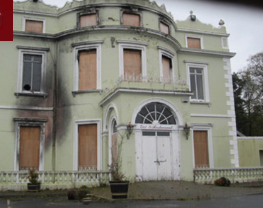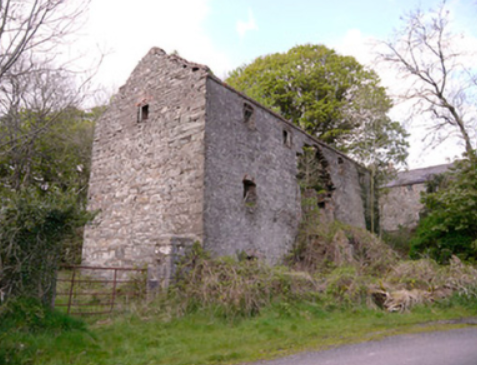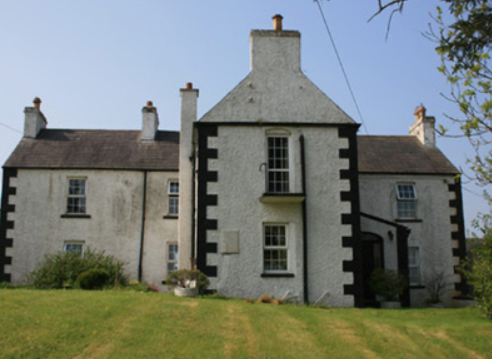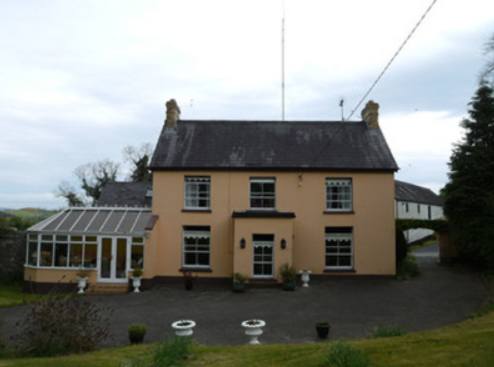Castleblayney House
Houses within 5km of this house
Displaying 10 houses.
Houses within 5km of Castleblayney House
Displaying 10 houses.
| House name | Description | |
|---|---|---|
| Blayney/Hope Castle | Originally known as Blayney Castle, this building was a late 18th century three storey five bay Georgian block in the town of Castleblayney. Lewis described it in the 1830s as ‘a handsome modern edifice, built near the site of the old castle’. It was the home of the Lords Blaney until sold in 1853 by the 12th and last Baron. Bought by Henry T. Hope and in his possession and that of his daughter’s descendants the Clintons until 1916 when it was sold. Since then the building has been a military barracks, a hospital in the 1930s and then a convent until the 1970s. In more recent times it was run as a hotel until badly damaged in an arson attack in 2010, since then it has been unoccupied. Owned by Monaghan County Council since the 1980s. |

|
| Drumcrew House | Drumcrew House located near a small lake of the same name and close to the town of Castleblayney. Valued at £10 at the time of Griffith’s Valuation, occupied by Henry Hunter and held from Henry T. Hope. Buildings are still located at this site. | |
| Dromore | A house located a short distance from Muckno or Castle Blayney lake. It was valued at £10 at the time of Griffith’s Valuation and held by Robert Bailey from Henry T. Hope. Members of the Bailey family were still resident in this townland in the early 20th century. A building is still located at this site. | |
| Church Hill | This house with a view to Muckno Lake is marked on the 1st edition 6 inch Ordnance Survey Map (1836). It had quite extensive gardens and a block of outbuildings. It was the home of the Harrison family from at least the early 19th century as George Harrison is recorded in the Tithe Applotment Book (1827). The buildings were valued in the mid-19th century at £7.5.0. George Harrison was the occupier holding the property from Henry T. Hope. Another member of the Harrison family, Francis, occupied a herd’s house close by. Members of the Harrison family still lived in this townland in the early 20th century. | |
| Church Hill | This house, with a view to Muckno Lake, is marked on the 1st edition 6 inch Ordnance Survey Map (1836). It had quite extensive gardens and a block of outbuildings. It was the home of the Harrison family from at least the early 19th century as George Harrison is recorded in the Tithe Applotment Book (1827). The buildings were valued in the mid-19th century at £7.5.0. George Harrison was the occupier holding the property from Henry T. Hope. Another member of the Harrison family, Francis, occupied a herd’s house close by. Members of the Harrison family still lived in this townland in the early 20th century. | |
| Laurel Hill House | Another house on the outskirts of Castleblayney, occupied by Henderson Persse and held from Andrew M’Math circa 1860 when it was valued at £20. It was located on the Hope estate and is now part of the Convent of Mercy complex of buildings. | |
| Thornford | This house located on the estate of the Marquess of Bath was associated with the nearby mill complex. Hamilton McMath was the proprietor in the mid-19th century, when the house was valued at £26 and the mill buildings (corn and flax) at £60. Buildings are still extant at this site. |

|
| Corratanty | An early 19th century house named on the 1st edition 6 inch Ordnance Survey map (1836) and located on the Templetown estate. A model farm was located here by the mid-19th century when the house was occupied by Andrew Hunter and the buildings valued at £23. David K. Hunter, farmer, was the occupier in the early 20th century. This house is still the centre of a working farm |

|
| Annaneese | Annaneese house is marked on the first edition 6 inch Ordnance Survey map and named on the 25 inch one. At the time of Griffith’s Valuation it was occupied by John McClatchey and held from Emily Leslie. This house is no longer extant. | |
| Annevale House | The present house dates from the late 19th century while the extensive outbuildings date from the end of the 18th century. Annevale is built on the site of an earlier house which is marked on the 1st edition Ordnance Survey map (1836). Valued at £10 in the mid-19th century it was occupied by John Callan who held it from Henry T. Hope. |

|

